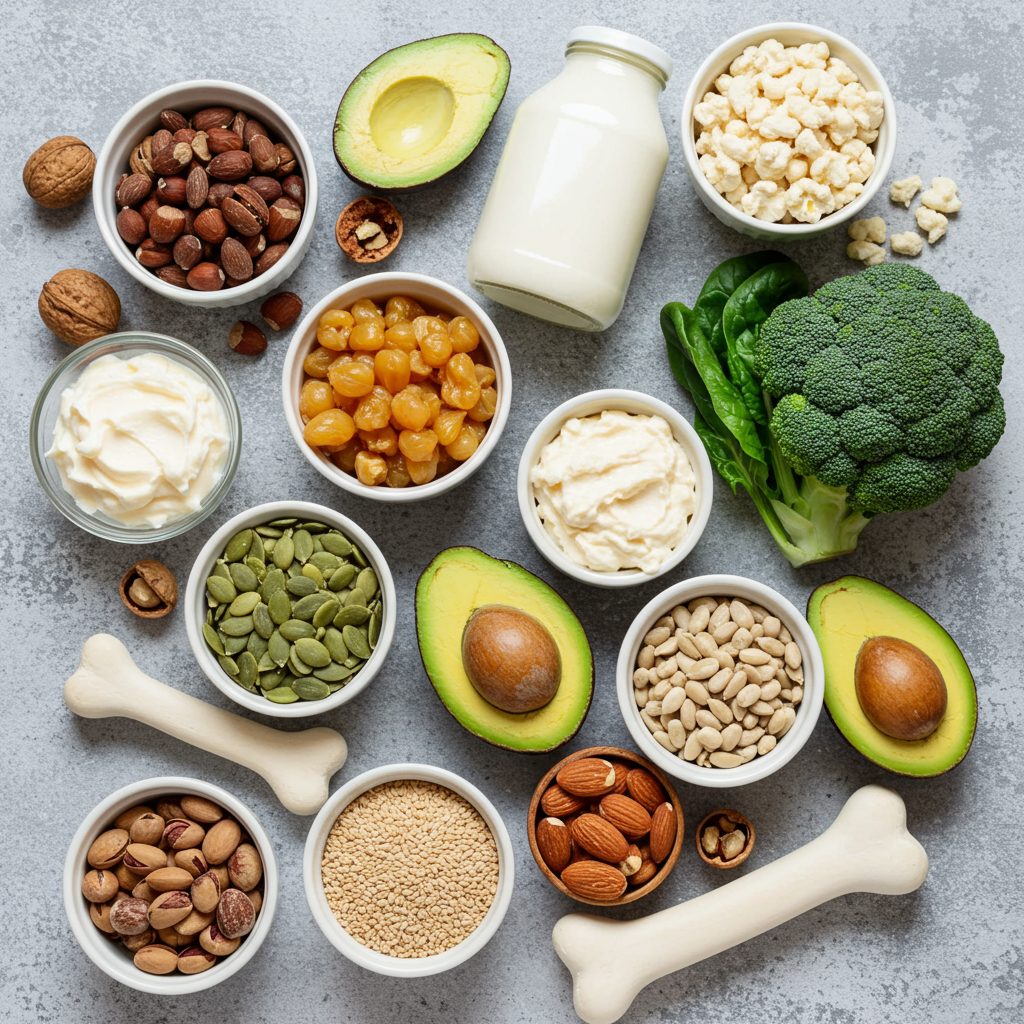Struggling to meet your daily calcium needs, especially if dairy isn’t a staple in your diet? You’re not alone. Many people underestimate the incredible variety of calcium food sources available beyond milk. This comprehensive guide uncovers unexpected ingredients that pack a powerful punch for bone health, muscle function, and nerve signaling. Prepare to discover how a diverse diet can easily help you achieve optimal calcium intake for a stronger, healthier you.
Why Calcium Is Non-Negotiable for Your Health
Calcium is far more than just a mineral; it’s a foundational building block for your body. This vital nutrient forms the majority of your bones and teeth, providing the structural integrity that keeps you active and strong. Without adequate calcium, your skeletal system would suffer.
Beyond its crucial role in bone health, calcium performs essential functions throughout your body. Registered dietitian nutritionist Meggie Connelly highlights its importance for proper muscle contraction and nerve signal transmission. Every heartbeat and every thought relies on this versatile mineral.
For most adults, the National Institutes of Health (NIH) recommends a daily calcium intake of approximately 1,000 to 1,200 milligrams. While a balanced diet often provides sufficient amounts, certain groups, including women, plant-based eaters, and individuals with specific health conditions, may find it challenging to meet these targets consistently.
Beyond Dairy: Uncovering Unexpected Calcium-Rich Foods
Think you need to chug milk for strong bones? Think again! A wealth of delicious and diverse calcium food sources can easily fit into any diet, dairy-free or otherwise.
Fortified Favorites and Plant-Based Powerhouses
Many familiar items in your grocery cart are silently boosting your calcium levels. Fortified plant milks, such as soy or almond varieties, often provide calcium amounts comparable to cow’s milk. For instance, the NIH notes that one cup of fortified soy milk can deliver as much calcium as an equal serving of nonfat dairy milk.
Calcium-set tofu is another excellent option, offering not only this bone-supporting mineral but also valuable protein. It’s a versatile ingredient perfect for various cuisines.
Don’t overlook your breakfast table or snack options! Many fruit juices and breakfast cereals are also fortified with calcium. The NIH estimates that a single cup of calcium-fortified orange juice can contribute around 27% of your daily calcium value, matching the amount found in 8 ounces of low-fat yogurt.
From the Sea: Tiny Bones, Big Calcium
When it comes to calcium food sources, some of the best come in small, edible packages. Registered dietitian Qianzhi Jiang and Harvard Health highlight canned fish with bones as an exceptional natural source. Varieties like salmon and sardines offer substantial calcium, particularly from their soft, edible bones. A 3-ounce serving of canned salmon, for example, can provide about 180 mg of calcium – far more than regular boneless salmon.
Green Giants: Leafy Veggies and More
Leafy green vegetables are celebrated for their nutrient density, and many are also fantastic for calcium intake. Jiang specifically points to kale, broccoli, and bok choy as excellent examples. These greens are easy to incorporate into stir-fries, salads, or smoothies.
Spinach, a powerhouse green, offers a significant amount of calcium, especially when cooked down. Interestingly, many of these calcium-rich greens, like spinach and kale, also provide a good dose of vitamin K. Recent research from Tufts University suggests that sufficient vitamin K is crucial for brain health, supporting memory and brain cell growth, further emphasizing the holistic benefits of these vegetables.
Fruitful Discoveries: Nature’s Sweet Calcium Surprises
Who knew some fruits could be calcium food sources? Prepare for some sweet surprises:
Prunes: New research published in The American Journal of Clinical Nutrition found that consuming just five to six prunes daily helped post-menopausal women preserve bone mineral density in their hips. These humble dried fruits appear to reduce inflammatory chemicals that contribute to bone breakdown.
Dried Figs: A delicious and convenient snack, just two dried figs can provide approximately 65 mg of calcium, along with fiber and other minerals.
Mulberries and Passion Fruit: While primarily known for their antioxidants and vitamins, a cup of mulberries or passion fruit can offer about 2 grams and 5.3 grams of protein respectively, along with some calcium.
Sweet Potatoes: Though mostly carbohydrates, each sweet potato contributes around 2 grams of protein and some calcium, alongside beta carotene and vitamin C.
Nuts, Seeds, and Beans: Small Wonders with Big Impact
These pantry staples are packed with nutrients, including calcium.
Almonds and Almond Butter: A half-cup of almonds contains roughly 190 mg of calcium, and two tablespoons of almond butter provide about 111 mg. They also offer healthy fats and protein.
Watermelon Seeds: Don’t discard them! An ounce of watermelon seeds contains an impressive 8 grams of protein and contributes to your calcium stores, surpassing the protein in an ounce of almonds.
White Canned Beans: Varieties like navy, cannellini, great northern, and lima beans are fantastic calcium food sources. Each cup can deliver around 190 mg of calcium, along with fiber and plant-based protein.
Other Savvy Calcium Boosters
Nutritional Yeast: Beloved by plant-based eaters for its cheesy flavor, one tablespoon offers 2 grams of protein and some calcium, especially if fortified with B12.
- High-Protein Vegan Pasta: Look for pasta made from black soybeans or mung and edamame. These can offer significant protein and often calcium, making your carb-rich meals more nutrient-dense.
- www.cbsnews.com
- www.livescience.com
- scitechdaily.com
- vegnews.com
- www.health.harvard.edu
The Dynamic Duo: Calcium and Vitamin D
For optimal calcium absorption, adequate vitamin D is essential. Think of them as a team: calcium provides the building blocks, and vitamin D ensures those blocks are properly utilized by your body. The National Academy of Medicine recommends about 800 IU of vitamin D daily for adults. Sun exposure, fatty fish, and fortified foods are good sources.
Lifestyle for Lasting Bone Strength
While diet is critical, strong bones also thrive on activity. Harvard Health emphasizes the importance of regular, low-impact exercise. Activities where your body works against gravity, such as brisk walking, stair climbing, or gentle aerobics, help stimulate bone growth and density. Always choose activities appropriate for your fitness level, especially if you have existing health concerns.
Monitoring Your Bone Health: When to Seek Expert Advice
Most people following a colorful, balanced diet with plenty of fruits, vegetables, whole grains, nuts, seeds, proteins, and calcium-rich foods are likely in a good place, according to registered dietitian Meggie Connelly. However, some individuals, particularly women, those with specific health conditions, or plant-based eaters, might still fall short on key nutrients like calcium.
If you have concerns about your calcium levels or bone density, consulting your doctor is crucial. For detecting osteoporosis before a fracture occurs, bone density testing using a DEXA scan is highly recommended. This quick, 15-minute X-ray measures mineral density in your bones. Women aged 65 and older, or those 50-64 with risk factors, should discuss regular DEXA scans with their physician.
Regarding supplements, registered dietitian Qianzhi Jiang advises viewing them as “supplemental sources” rather than primary. Prioritizing natural calcium food sources maximizes the benefits of various nutrients and minimizes risks associated with overconsumption. Harvard Health also cautions against excessive supplementation, noting potential links to kidney stones, and warns against unproven bone-boosting products like strontium.
Frequently Asked Questions
What is the recommended daily calcium intake for adults, and why is it so important?
The National Institutes of Health (NIH) generally recommends that adults aim for 1,000 to 1,200 milligrams of calcium each day. This intake is crucial because calcium is the primary mineral forming the structure of your bones and teeth. Beyond skeletal strength, it plays vital roles in essential bodily functions such as facilitating proper muscle contraction and enabling effective nerve signaling throughout your body.
Beyond dairy, what are some truly surprising food sources of calcium mentioned in the article?
While fortified plant milks and tofu are well-known non-dairy options, some truly surprising calcium food sources include prunes, which new research suggests can help post-menopausal women preserve bone density. Other unexpected sources are dried figs, canned fish with edible bones like salmon and sardines, and various white beans (such as navy or cannellini beans). Even watermelon seeds contribute to calcium intake alongside their high protein content.
When should someone consider calcium supplements, and what’s the expert advice on prioritizing sources?
Experts suggest that a balanced diet rich in diverse calcium food sources should be the primary method for meeting your daily calcium needs. However, if dietary intake consistently falls short—especially for individuals in at-risk groups like women, plant-based eaters, or those with certain health conditions—consulting a doctor about supplements is advisable. Registered dietitian Qianzhi Jiang emphasizes that supplements should only be “supplemental,” reinforcing the importance of prioritizing whole foods to ensure broad nutrient intake and minimize potential risks of overconsumption.
Conclusion: Build a Stronger You, One Bite at a Time
Achieving adequate calcium intake doesn’t have to be a struggle, even for non-milk drinkers. By exploring the vast array of calcium food sources available, from fortified plant milks and calcium-set tofu to canned fish with bones, leafy greens, and even surprising fruits like prunes, you can nourish your body effectively. Remember the crucial role of vitamin D for absorption and complement your diet with regular low-impact exercise for holistic bone strength. Prioritize whole foods, be mindful of your body’s needs, and consult with a healthcare professional if you have concerns about your bone health or mineral absorption. Embrace these diverse foods, and you’ll be well on your way to a stronger, more resilient you.



